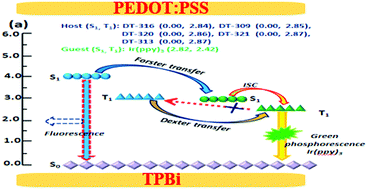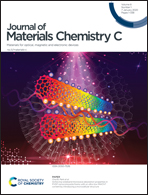Solution-processed hybrid hosts: a way to explore high triplet energy with admirable current and power efficiency without outcoupling techniques for phosphorescent OLEDs†
Abstract
Host materials with maximum recombination efficiencies and high triplet energies offer the best prospects for high efficacy phosphorescent organic light emitting diodes (PhOLEDs). However, their synthesis is a major challenge due to the constraints associated with existing PhOLEDs. While there exists a flood of vacuum-deposited host materials, the present need is for solution-processed hosts due to their many benefits. Herein, a library of new solution-processed donor–acceptor based highly efficient hosts is developed (molecules DT316, 309, 313, 320, 321) that comprise the electron transporting unit benzimidazole and the hole transporting unit triphenylamine. All the molecules possess good solubility in common organic solvents. Their highly twisted conformations bestow these molecules with high thermal stability and remarkable triplet energies of 2.79–2.87 eV. The use of these new host materials as emissive layers in solution-processed green PhOLEDs with Ir(ppy)3 as the emitter gives excellent efficacy with a maximum power efficiency of 54.4 lm W−1, a current efficiency of 73.1 cd A−1 and a brightness of 21 880 cd m−2, while with Ir(2-phq)3 for red devices, values of 25.6 lm W−1, 19.3 cd A−1, and 15 519 cd m−2, are respectively obtained, without any additional external outcoupling techniques. The effective host-to-guest energy transfer, balanced charge carriers in the recombination zone, and the ability to generate excitons on both the host and the guest account for this marvellous performance.



 Please wait while we load your content...
Please wait while we load your content...